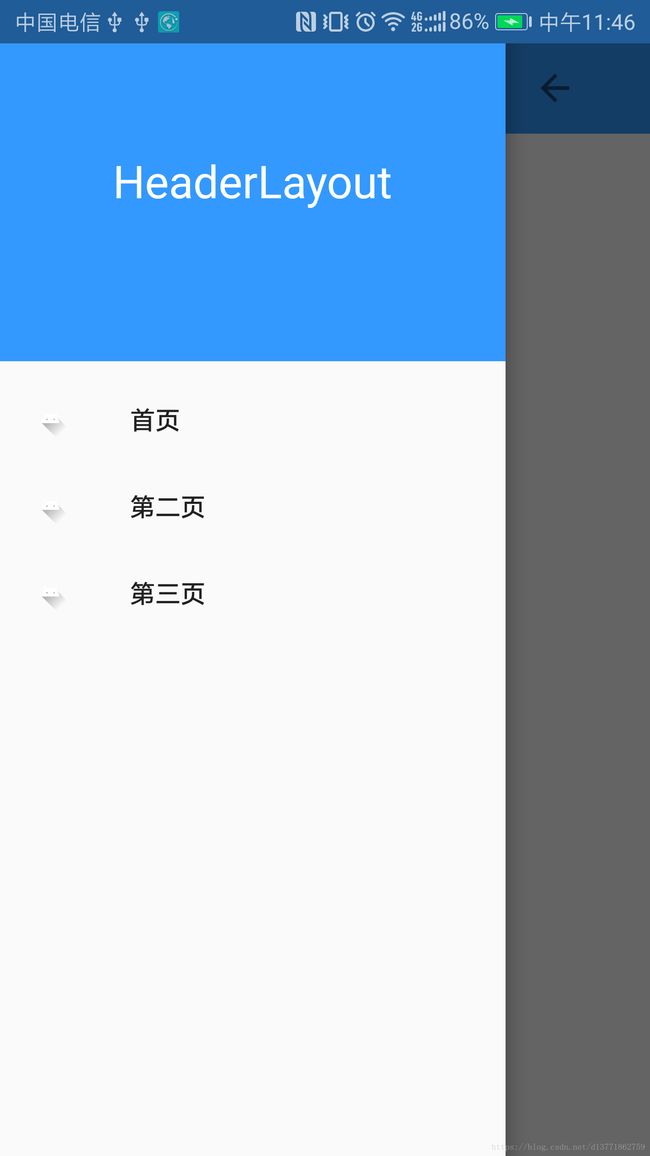(Android)使用NavigationView实现侧滑菜单栏
一、事先在build.gradle(Module:app)中添加依赖
compile 'com.android.support:appcompat-v7:27.1.1'
compile 'com.android.support:design:27.1.1'二、主页面布局
activity.xml
<android.support.v4.widget.DrawerLayout
xmlns:android="http://schemas.android.com/apk/res/android"
xmlns:app="http://schemas.android.com/apk/res-auto"
android:id="@+id/drawer_main_layout"
android:layout_width="match_parent"
android:layout_height="match_parent"
android:clipToPadding="false"
android:fitsSystemWindows="true">
<LinearLayout
android:layout_width="match_parent"
android:layout_height="match_parent"
android:orientation="vertical">
<android.support.v7.widget.Toolbar
android:id="@+id/tb_main_toolbar"
android:layout_width="match_parent"
android:layout_height="50dp"
android:background="#3399FE"
app:contentInsetStart="0dp"
>
<TextView
android:layout_width="match_parent"
android:layout_height="match_parent"
android:gravity="center"
android:paddingRight="60dp"
android:text="首页"
android:textSize="25sp"
android:textColor="#fff"
/>
android.support.v7.widget.Toolbar>
<FrameLayout
android:id="@+id/frame_main_content"
android:layout_width="match_parent"
android:layout_height="match_parent">
FrameLayout>
LinearLayout>
<android.support.design.widget.NavigationView
android:id="@+id/nv_main_menu"
android:layout_width="wrap_content"
android:layout_height="match_parent"
android:layout_gravity="left"
app:headerLayout="@layout/navigation_header"
app:menu="@menu/drawer"
>
android.support.design.widget.NavigationView>
android.support.v4.widget.DrawerLayout>navigation_header.xml
<LinearLayout android:layout_width="match_parent"
android:layout_height="200dp"
android:background="#3399FE"
android:gravity="center"
xmlns:android="http://schemas.android.com/apk/res/android">
<TextView
android:id="@+id/tv_header_text"
android:layout_width="wrap_content"
android:layout_height="wrap_content"
android:text="HeaderLayout"
android:textColor="#fff"
android:textSize="25sp"/>
LinearLayout>在values文件夹下新建menu文件夹,在menu文件夹下新建drawer.xml
values/menu/drawer.xml
<menu xmlns:android="http://schemas.android.com/apk/res/android">
<item
android:id="@+id/item_first"
android:icon="@drawable/ic_launcher_foreground"
android:title="首页">
item>
<item
android:id="@+id/item_second"
android:icon="@drawable/ic_launcher_foreground"
android:title="第二页">
item>
<item
android:id="@+id/item_third"
android:icon="@drawable/ic_launcher_foreground"
android:title="第三页">
item>
menu>最后的结果:

上图就是最初的结果,但是还是很粗糙,所有要对齐进行修改,首先要将APP自带的Toolbar去掉。
三:去除APP自带的Toolbar以及修改信息栏的背景颜色
在styles.xml中添加一个style
接着在AndroidManifest.xml文件中修改Theme
<application
android:allowBackup="true"
android:icon="@mipmap/ic_launcher"
android:label="@string/app_name"
android:roundIcon="@mipmap/ic_launcher_round"
android:supportsRtl="true"
修改这里的话会去除Toolbar
android:theme="@style/AppTheme.NoActionBar">
<activity android:name=".MainActivity">
<intent-filter>
<action android:name="android.intent.action.MAIN" />
<category android:name="android.intent.category.LAUNCHER" />
intent-filter>
activity>
application>修改信息栏的背景颜色
添加依赖
compile 'com.readystatesoftware.systembartint:systembartint:1.0.3'MainActivity.java
private void initWindow(){
if (Build.VERSION.SDK_INT >= Build.VERSION_CODES.KITKAT){
getWindow().addFlags(WindowManager.LayoutParams.FLAG_TRANSLUCENT_STATUS);
getWindow().addFlags(WindowManager.LayoutParams.FLAG_TRANSLUCENT_NAVIGATION);
SystemBarTintManager tintManager = new SystemBarTintManager(this);
tintManager.setStatusBarTintColor(Color.parseColor("#3399FE"));
tintManager.setStatusBarTintEnabled(true);
}
}在onCreate中调用即可
四、在Toolbar上添加图标,并使Toolbar随侧滑菜单滑动
/**
* 设置侧拉框(NavigationView)
*
* @param toolbarChild
*/
private void initSlid(final Toolbar toolbarChild) {
final DrawerLayout mDrawerLayout = findViewById(R.id.drawer_main_layout);
ActionBarDrawerToggle mDrawerToggle = new ActionBarDrawerToggle(MainActivity.this,
mDrawerLayout,toolbarChild, R.string.drawer_open, R.string.drawer_close) {
@Override
public void onDrawerSlide(View drawerView, float slideOffset) {
View content = mDrawerLayout.getChildAt(0);
int offset = (int) (drawerView.getWidth() * slideOffset);
content.setTranslationX(offset);
}
@Override
public void onDrawerOpened(View drawerView) {
super.onDrawerOpened(drawerView);
}
@Override
public void onDrawerClosed(View drawerView) {
super.onDrawerClosed(drawerView);
}
@Override
public void onDrawerStateChanged(int newState) {
super.onDrawerStateChanged(newState);
}
};
mDrawerToggle.syncState();
mDrawerLayout.addDrawerListener(mDrawerToggle);
mNavigation.setItemIconTintList(null);
}在strings.xml文件中添加
<string name="drawer_open">openstring>
<string name="drawer_close">closestring>五、侧滑菜单操作
1、获取headerLayout的布局控件
View mHeaderView = mNavigation.getHeaderView(0);
TextView tv = mHeaderView.findViewById(R.id.XX_XX_XX);2、设置menu的item默认选中
// 设置导航栏默认选中
mNavigation.getMenu().getItem(0).setChecked(true);3、设置点击事件
mNavigation.setNavigationItemSelectedListener(new NavigationView.OnNavigationItemSelectedListener() {
@Override
public boolean onNavigationItemSelected(@NonNull MenuItem item) {
switch (item.getItemId()) {
case R.id.item_one:
getSupportFragmentManager().beginTransaction().replace(R.id.frame_content, new MenuOne).commit();
// HeaderLayout的控件
tvName.setText(R.string.menu1);
tvName.setTypeface(Typeface.SANS_SERIF);
break;
case R.id.item_two:
getSupportFragmentManager().beginTransaction().replace(R.id.frame_content, new MenuTwo()).commit();
tvName.setText(R.string.menu2);
tvName.setTypeface(Typeface.SANS_SERIF);
break;
case R.id.item_three:
getSupportFragmentManager().beginTransaction().replace(R.id.frame_content, new MenuThree()).commit();
tvName.setText(R.string.menu3);
tvName.setTypeface(Typeface.SANS_SERIF);
break;
default:
break;
}
item.setChecked(true);
// DrawerLayout控件
mDrawerLayout.closeDrawers();
return true;
}
});